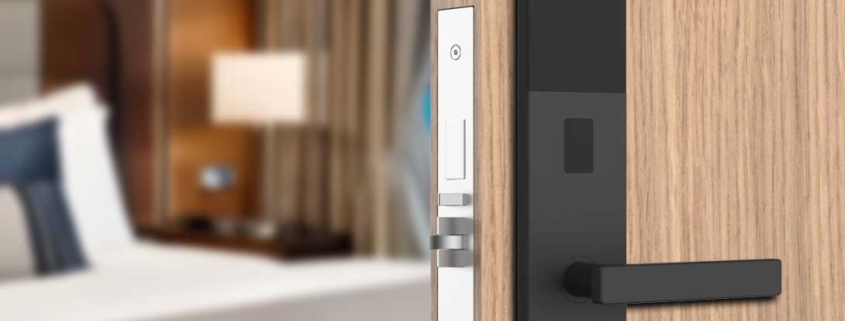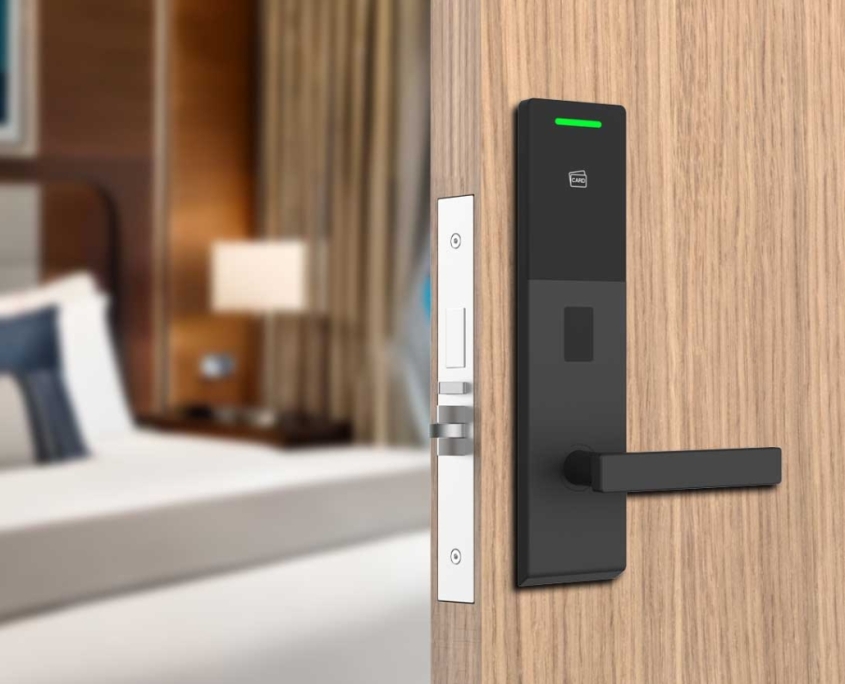What Should You Look for in Hotel Door Locks?
When choosing hotel door locks, factors such as security, convenience, management efficiency and cost need to be considered. The following are the key considerations:
1. Security
- Cylinder grade: Priority should be given to C grade lock cylinder , which has stronger ability to prevent technical opening and violent damage.
- Anti-copying design: Mechanical keys need to have a patented structure or smart keys (such as magnetic cards, fingerprints, passwords, etc.) to avoid being copied.
- Anti-picking alarm: Some smart locks support abnormal unlocking alarm (e.g. multiple password errors, prying triggered alarm).
- Data encryption: Smart locks need to support advanced encryption (e.g. AES-128/256) to prevent wireless signals from being intercepted or cracked.
2. Lock type selection
Mechanical lock: low cost but inconvenient to manage, suitable for low budget or standby scenarios.
Smart lock (mainstream choice):
- IC card/RFID lock: need to pay attention to card encryption (e.g. Mifare Classic is easy to crack, suggest DESFire or CPU card).
- Bluetooth / NFC lock: cell phone lock, need to be compatible with mainstream protocols (such as Bluetooth 5.0, NFC Type-B).
- Password lock: support temporary password or dynamic password is more secure.
- Biometric lock (fingerprint, face): high security but high cost, need to consider the environmental adaptability (e.g., moisture, low temperature).
3. Management and Networking Function
- Centralized Management: Remote card making, authority assignment and record inquiry through PMS (Hotel Management System).
- Real-time monitoring: door lock status and unlocking records are synchronized to the background, and abnormal operations can be traced.
- OTA Upgrade: Support remote update of firmware, fixing loopholes or adding new functions.
4. Durability and environmental adaptation
- Material: lock body selected zinc alloy or stainless steel, panel scratch-resistant and wear-resistant (such as tempered glass).
- Waterproof and dustproof: IP54 and above, suitable for wet or outdoor areas.
- Battery life: smart locks need to be designed for low power consumption (e.g., dual-circuit power supply) and support power warning.
5. Installation and Maintenance
- Compatibility: Confirm that the lock size matches the existing door thickness and aperture (e.g. European/American Standard).
- Installation services: some manufacturers provide professional installation to avoid self-commissioning problems.
- After-sales support: warranty period (recommended 2 years or more), the speed of supply of accessories, fault response time.
6. Cost and Brand
- Budget Balance: Intelligent locks have a higher unit price than mechanical locks, but save labor management costs in the long run.
- Brand recommendation: keyplus hotel lock manufacturer.
7. Other Details
- Emergency Solution: Retain mechanical key or emergency power port (e.g. Micro USB for temporary power supply).
- Fire Compliance: Pass the fire certification .
- User experience: silent design, operation guidance (e.g. voice prompts), multi-language interface.
Summary Recommendations
- High-end hotels: choose networked smart locks (e.g. fingerprint + IC card + mobile APP), integrated PMS to improve management efficiency.
- Mid-range hotels: RFID card lock + combination lock, taking into account the cost and security.
- B&B/YTS: Combination lock or Bluetooth lock, flexible management of short-term rental customers.
Before purchase, it is recommended to ask for samples for testing and refer to the cases of similar hotels to ensure that the door lock matches the actual needs.




